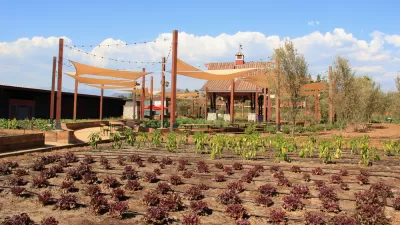With a year-round temperate climate and a history of widespread urban agriculture, it's a shame that Los Angeles now finds itself ranked 43rd amongst America's 50 largest cities for their support of local food. Can L.A. turn back the clock?
The good news, according to Willy Blackmore, is that if Los Angeles devoted just 9 percent of its urban land to crops, it could produce enough food to feed its residents. The bad news, for now, is that with only 6,000 acres of land in L.A. County devoted to growing food, the area is about 63,000 acres short of becoming "a self-sustained urban farming mecca."
Blackmore profiles a group of activists that are trying to turn the bad news into good news by pushing, "the city's agricultural policy further into the 21st century-and into the upper ranks of American cities with progressive urban agriculture agendas."
"'We all want to grow food and we want it to be easy,' says Francesca De la Rosa, co-chair of the Los Angeles Food Policy Council's working group to advocate for urban agriculture policy in the city. That would mean limiting bureaucratic hurdles, clarifying the rules, and extending some base-level incentives to urban agriculturalists-from overhauling the city's free compost and mulch giveaway programs to extending the reduced water-usage rate that big agriculture enjoys for smaller edible landscaping and gardening projects."
According to Blackmore, "Activists are also encouraging L.A. to find farming opportunities in its own backyard-the city's underused public parks, city-owned vacant lands, schools, hospital grounds, green spaces between the sidewalk and the street-even its prison yards. To push the issue, L.A.-based edible landscaping outfit Farmscape has launched a stunt campaign to elect the company mayor under a platform to 'bring farms back to the city.'"
FULL STORY: Lifestyle Growing Pains: Why Is L.A. So Hard on Urban Farmers?

Alabama: Trump Terminates Settlements for Black Communities Harmed By Raw Sewage
Trump deemed the landmark civil rights agreement “illegal DEI and environmental justice policy.”

Study: Maui’s Plan to Convert Vacation Rentals to Long-Term Housing Could Cause Nearly $1 Billion Economic Loss
The plan would reduce visitor accommodation by 25% resulting in 1,900 jobs lost.

Planetizen Federal Action Tracker
A weekly monitor of how Trump’s orders and actions are impacting planners and planning in America.

Wind Energy on the Rise Despite Federal Policy Reversal
The Trump administration is revoking federal support for renewable energy, but demand for new projects continues unabated.

Passengers Flock to Caltrain After Electrification
The new electric trains are running faster and more reliably, leading to strong ridership growth on the Bay Area rail system.

Texas Churches Rally Behind ‘Yes in God’s Back Yard’ Legislation
Religious leaders want the state to reduce zoning regulations to streamline leasing church-owned land to housing developers.
Urban Design for Planners 1: Software Tools
This six-course series explores essential urban design concepts using open source software and equips planners with the tools they need to participate fully in the urban design process.
Planning for Universal Design
Learn the tools for implementing Universal Design in planning regulations.
Caltrans
Smith Gee Studio
Institute for Housing and Urban Development Studies (IHS)
City of Grandview
Harvard GSD Executive Education
Toledo-Lucas County Plan Commissions
Salt Lake City
NYU Wagner Graduate School of Public Service



























